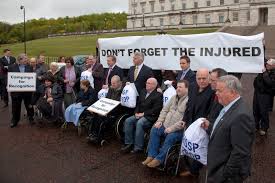By Mark Thompson
Today the Victims Commission published its recommendations on a pension for those most seriously injured during the conflict. The Commission rightly advised that all those with serious life-diminishing injuries should be awarded a small sum enabling them to cushion the deficit of not being able to work since their injuries and thus accumulate pension credits. Given that many of those who would qualify are now at a pension age, or nearing it, such a scheme would greatly reduce the financial hardships they face, provide an improved level of financial independence, and generally ease the daily burden.
For many potential recipients a victims’ pension would be societal recognition of their injuries – a long overdue form of practical and symbolic reparation – and would restore a sense of dignity. It would be a measure of our compassion and humanity as a society. It is the right thing to do.
Of course the plight of those seriously injured and the call for a related victims’ pension was made well over a decade ago and has been held hostage to wider political disagreement; namely by the DUP who have blocked the pension.
This centers on the 2006 Victims & Survivors Order, a piece of Westminster legislation which rightly sets out in law an inclusive definition of a victim arising from the conflict. This has been the only logical, workable and successful solution and was built around the first executive position. It is the only way forward in terms of building a better future.
Our conflict ended with a political solution where the primacy of politics was to prevail, where there were no winners or losers. It was a negotiated settlement and a shared way forward. However, political unionism doesn’t even engage in post conflict-resolution. They and the British government both act with an indignant sense of privilege and moral superiority as though they played no part in the conflict. They act as though they didn’t engage in decades of economic, structural and physical violence, inflame, encourage, legislate and resource for such, and that somehow they have no responsibility whatsoever for what took place. In their world it was all the fault of republicans, with loyalism thrown in for ‘balance’.
Without any sense of self-reflection this same cohort lecture us about ‘morality’ and ‘terrorism’ in respect to conflict violence. Of who is and isn’t a victim of the conflict.
It is a world that requires the continued criminalization of one set of conflict actors – principally republicans – juxtaposed with the deluded notion that state violence was somehow ‘different’, ‘understandable’, ‘necessary’ and ‘just’. This is a prerequisite for maintaining a pro-state unionist conflict narrative. It is a narrative threatened only by truth hence the vehement opposition to every aspect of addressing legacy including an inclusive definition and a victims’ pension.
Political unionism in its entirety called for and successfully obtained hundreds of millions of pounds in payments and financial rewards for members of every section of the North’s combatant based state forces from the RUC, UDR/RIR, to the prison service. Comparatively in scale a victims’ pension would barely register.
Given the levels of systemic collusion found by Lord Stevens in his investigations; the Oireachtas Committee citing UK state terrorism in respect to Dublin/Monaghan and other related incidents; judge Peter Cory; and de Silva citing that 85% of intelligence held by the UDA came directly from the RUC and British army intelligence, there wasn’t one eyebrow raised never mind a question asked about these atrocities when paying out millions. There wasn’t one voice saying if all this took place then who is responsible and should they be entitled to be rewarded from the public purse. This notwithstanding 367 direct state killings, the vast majority of unarmed civilians and children, for which a blanket impunity followed.
Compare this to the hysterical reaction that someone from a non-state combatant group injured in the conflict might avail of a victims’ pension and we get a measure of the level of hypocrisy. Noting that in all likelihood the handful, less than ten out of an approximate 700/800 that would be eligible, most won’t apply. It is more about the principle of standing up to the continued criminalization and pompous moral indignation reserved only for one set of combatants concerning conflict culpability alongside the aforementioned moral posturing and sense of entitlement in justifying or excusing off state violence.
Similarly when state violence and collusion are raised we often hear that if state combatants did wrong or ‘dishonoured the code’ then they should face the full rigours of the law. However, when the processes of independent investigation are presented, as with Stormont House Agreement that would in fact establish wrongdoing, this too becomes victim to the necessity of maintaining the pro-unionist state narrative.
It is a scandal that the politics of fear and division are allowed to foster amongst those most harmed – in denying care, compassion and dignity as they struggle – all in order that the unionist and British position of moral superiority about the conflict can be falsely maintained.











